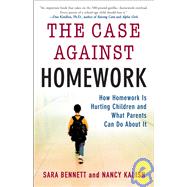
| Introduction | p. 1 |
| Fried Brains and Frayed Tempers | |
| So Much Work, So Little Time | p. 9 |
| The Myth of the Homework System: What Teachers Don't Learn About Homework | p. 35 |
| The Family Fallout: From Parent to Taskmaster | p. 55 |
| The Creation of the Homework Potato | p. 81 |
| "I Hate School!": When Learning Becomes Drudgery | p. 101 |
| Ending Homework Hell | |
| Homework Deconstructed: Brain Work or Busywork? | p. 121 |
| The Real Way to Help with Homework | p. 153 |
| What You Should Know Before You Talk to the Teacher | p. 167 |
| When There's a Problem: How to Be Your Child's Best Advocate | p. 183 |
| Getting the School on Your Side: Working Toward a Saner Homework Policy | p. 223 |
| Tools for Homework Reform | |
| The Case Against Homework: Fact Sheet | p. 259 |
| Sample Homework Policies | p. 261 |
| Sample Parent Surveys | p. 266 |
| Resources | p. 271 |
| Acknowledgments | p. 277 |
| Index | p. 283 |
| Table of Contents provided by Ingram. All Rights Reserved. |
The New copy of this book will include any supplemental materials advertised. Please check the title of the book to determine if it should include any access cards, study guides, lab manuals, CDs, etc.
The Used, Rental and eBook copies of this book are not guaranteed to include any supplemental materials. Typically, only the book itself is included. This is true even if the title states it includes any access cards, study guides, lab manuals, CDs, etc.
Excerpted from The Case Against Homework: How Homework Is Hurting Our Children and What We Can Do about It by Sara Bennett, Nancy Kalish
All rights reserved by the original copyright owners. Excerpts are provided for display purposes only and may not be reproduced, reprinted or distributed without the written permission of the publisher.